“Who are we making this record for? Ourselves? Our fans? Good question…”
After a heavy spate of touring over the past few years, it’s back to the studio for Vancouver electro-industrial legend Bill Leeb. The Front Line Assembly front man has no less than three albums in the works: the recently-completed FLA soundtrack to real-time-strategy game Airmech, an entirely new and separate Front Line record, and Music Box Opera, the first new LP from Delerium in six years. We spoke with Leeb and songwriting partner Jeremy Inkel at Inkel’s basement studio about those projects, expectations and audiences, and cEvin Key’s early days in retail…
ID:UD: How did you guys get involved with Airmech?
Bill: The guy was just a Front Line fan. They liked the music and they thought this game could suit our forte. They’re from Seattle, they came up here and we hung out. Super nerdy, super nice guys…
Jeremy: …Who were really into FLA.
Bill: They let us keep all of the publishing rights. On most games, they don’t like paying royalties anymore. They’ll just buy the music or let you have it this way.
ID:UD: You also worked on the Quake III soundtrack. How different is working on a game soundtrack now, twelve years later? It is the same approach with you two working together as opposed to you and Chris Peterson? How did you approach it creatively?
Bill: This one was way easier. Jared [Slingerland of FLA] and Craig [Huxtable of FLA and Landscape Body Machine] both have their own setups. Craig’s got a studio…
Jeremy: Sasha [Kevil] was in on it too…
Bill: Yeah, so you had five people all writing ideas and we’d come here. We’d sit, we’d play, we’d work, we’d tweak. It was way easier than me and Chris trying to work around stuff in the old days.
Jeremy: And correct me if I’m wrong, but the Quake III music was never released as a soundtrack, was it? You only heard it in the game. So that’s also different. Right off the bat, the intent was to put this out as a piece of work, which was a bit of a game changer as well.
ID:UD: Does that bring it more in line with the traditional writing process of an FLA record?
Jeremy: Yes. The only restriction being no vocals, but that opens up a lot of other doors, and we’re able to do things I don’t think we’d normally even be considering. Maybe for a Noise Unit record but not for an FLA one.
Bill: Metropolis is gonna put it out in November. We’ll see. It’s under Front Line, so whatever it does…
Jeremy: There’s gonna be a new website launch for Airmech in September.
ID:UD: Now that the traditional model for making money through music has, if not collapsed, been dialed back for a lot of people, a lot of people are looking more into doing soundtracks for games or indie movies. Is that something you guys are interested in pushing further?
Bill: There’s that convention [PAX] happening in Seattle that the Carbon guys suggested we go to to make contacts. Maybe if I was more ambitious, but I should go down and just say hi. Maybe I could wear a sandwich board. “Hi, I’m Bill Leeb.” *laughter*
Jeremy: “Seeking to pursue new interests.”
ID:UD: You guys have a new Delerium record coming out, you just finished Airmech, you’re starting a new full-length Front Line record. It seems like a big burst of creativity for you guys, how do those projects bleed into each other?
Bill: The synopsis behind this thing is that we’ve done a lot of shows in the last four or five years, so we said “let’s stop touring for a while and do a bunch of music for a change.” The last Delerium record was almost six years ago.
Jeremy: It’s been a while since Improvised Electronic Device, too.
Bill: [Jeremy] and I have been doing songs for a while now, with Rhys I went down last January to LA and did a bunch of songs. It takes longer and longer when you’re established because people scrutinize you more. You can’t just put something out if you’re thinking “eh, it’s not gonna be that good.” Now, like you said, the music industry’s so tough, there’s no money in it. So I think that was a part. But we also wanted to just make a bunch of music.
Jeremy: We’ve got some remixes coming…
Bill: For Delerium we’ve got one of the best dubstep guys, Six Lions, he’s doing one. He’s kind of in the same world as Deadmaus and Skrillex. I’m sure some people in our world are gonna go “dubstep?”, but there’s a whole other world out there. That first “Monarch” single, Nettwerk just wanted to do a low-budget video and put out a song that old Delerium fans would be familiar with and just build it a bit. That kind of worked. The next one will be the big single.
ID:UD: It’s funny that you mention old Delerium fans, because Delerium as a project has an enormous history, with early records being very different from Semantic Spaces, completely different sounds. With a project that has had so much evolution in the sound of it, did you feel that there was an audience that you had to address, people that were into that mid-period Delerium sound, or were you just gonna do want you wanted to do?
Bill: You grow with technology, with what’s new and evolving. Meeting Jeremy and Jared and those guys, it sort of becomes old meets new. You have bands like Massive Attack and Dead Can Dance who are still doing good stuff. I feel like we’re kind of in the same vein as them.
ID:UD: An institution?
Bill: Well, the good stuff stays around. Some of it evolves, some of it morphs. I think the core is still there, you bring in some young people, they throw their spin on it.
Jeremy: You get a lot of fans, also with Front Line, asking “couldn’t you guys go back to ‘Stone Tower'” or something, and you can’t go back even if you’re really into that stuff. You’re not in that time. To try to grab that moment and do it over and over…it doesn’t sit right for some reason. You can try to do it but it doesn’t really work.
ID:UD: Did touring with Rhys help kickstart the idea of doing Delerium again?
Bill: Not really. Everyone has their lives which run their courses, for example Rhys had recently had a child. You have to catch every artist in their moment. For singers on the Delerium album, one’s got her own album coming out, this one’s pregnant, this one’s not available. You’ve gotta weave your way through, and everyone’s lives take precedent.
ID:UD: We read that the record is basically half Rhys, half Jeremy collaboration wise, is that true?
Bill: Basically, yeah.
Jeremy: There’s one track that’s all three of us, but it’s pretty much half and half.
Bill: I think that makes the record kind of cool. It’s two different schools, we staggered the songs, it makes it more interesting.
ID:UD: So there’s a dynamic kicking back and forth between the two?
Jeremy: Yeah, and with Greg [Reely] mixing it, he brings everything into his world, and that’s kind of the glue.
Bill: With Jeremy it’s like the Trentemøller camp, with Rhys it’s more classical Delerium. I think it’s more interesting for new and old fans.
Jeremy: All the stuff Bill and I worked on together was really going for nouveau electronics and atmospheres. The first track we did was “Frostbite” with Annalee Williams. She did a track on The Chemical Brothers’ Push The Button, the track “Hold Tight London”. We’re really happy with that one.
ID:UD: Moving onto the new FLA record, are you guys just getting started? What stage are you at?
Bill: The “Oh my god” stage.
Jeremy: The smoking weed and freaking out stage. *laughter* I think Bill will agree with me here. We worked really hard on Airmech and put together a new process over the last seven months. This is after years of touring together and building towards it. I think Airmech was a really great way to test the waters with the new things we’re trying to do, and instead of feeling tired, everyone seemed very into it, gunning forward. No one seems to be worried about anything other than meeting our deadlines and it being good.
Bill: It is different, though. Writing “song” songs is way different from doing ambient pieces, just catching a vibe. People want aggression. Takes energy to do that. The beginning’s always hard, and when you’re shifting gears between projects, getting into the next frame of mind, finding a song that’ll represent the album…once you get there it’s okay.
Jeremy: That’s what we’re trying to do right now. Find that one song, that one thing that’s gonna capture everything…
“When Rhys and I started it was all about the technology. Samplers were brand new, so we were just thinking about what we could do with them.”
ID:UD: There’s always been a mutability about Front Line. It’s changed a lot over the years, integrating new sounds, changing workflow, doing more of a certain type of song. How much of what’s going into this record is based on your current interests? What makes Front Line change and evolve?
Bill: Reacting to everything around us: technology, sound, life experiences, people that we work with.
Jeremy: The live shows have been something we’ve really drawn on ever since I joined the band. When we went in to do IED we were really digging the guitar and wanted to do the heaviest thing we could find. It feels like the opposite this time.
Bill: You reach a point where you’ve played all the big festivals in your genre, so okay, you’re at this level with all these other bands, there’s the Rammsteins, the Trents. So when you make a record, are you making it for yourself, are you trying to set a new standard? How many standards can you set? Where do you wanna go with it? It becomes more and more complex. When Rhys and I started it was all about the technology. Samplers were brand new, so we were just thinking about what we could do with them. Now, it’s not about that. I’m not really sure. Who are we making this record for? Ourselves? Our fans? Good question…
Jeremy: We’ve already announced that for this record we want to put the guitars down and go back to – and this sounds really cliche, especially in an interview – but a roots record for FLA. FLA started out as very EBM, into the 242, Nitzer Ebb angle and progressed into all these other styles over the years. To come back to that is refreshing. I think that’s the attitude we’ve gone into it with. Electronic music seems to have revitalized itself, too. I don’t think it’s what people are really expecting from us right now.
ID:UD: You were moving in that direction a bit with IED, because “Shifting Through The Lens” has a very classic EBM bassline, with a real dancefloor groove…
Jeremy: That was the only one!
Bill: That’s what I’ve been telling Jeremy, this record is all about the dancefloor. That’s where we want to be at. I think we’ve done enough of the metal/industrial crossover with the Millennium and Roadrunner days.
Jeremy: “Shifting” almost ended up getting B-sided a couple of times, but it kept coming back, there was something about the hook. Even when it was chosen to be the single I was worried it didn’t represent the rest of the album, but it was a good single and the right decision.
Bill: It’s scary trying to come up with tracks like that again. Every record feels like a huge mountain you have to climb, and you’re looking at it, hoping…
Jeremy: …That there’s an elevator? *laughter*
Bill: Well, you still want a bit of a challenge. People can get pretty critical. You can have two great albums, then one bad one and it’s like “Oh, he sucks,” which is pretty unfair.
Jeremy: It’s like…We’ve been trying to figure out how to tour Europe again. We’ve had a lot of really good tours in Europe, and we have one bad one, the second half of the last one we did, and all anybody could talk about was us pulling lower numbers than usual at some of those shows.
Bill: People look at your last record, your last film, that’s how you’re judged. They don’t look at your whole body of work.
Jeremy: Or, you don’t show up to one gig and therefore you’re a giant asshole, but of course he’s showed up to five hundred other ones. *laughter*
“I don’t want it to sound retro or cheesy…”
ID:UD: Back to the idea of a roots FLA record, Bill, you’ll have a very clear memory of what it was like to work on those original FLA records, whereas Jeremy, you grew up as an FLA fan listening to them. Does that distinction enter into making this record?
Jeremy: I’d say it’s pretty common ground at this point. We’re used to speaking the same musical language. He’ll reference a certain old synth and I’m pretty well versed in them. There’s a lot of times when I’m reminding him of stuff he did.
ID:UD: As far as a roots FLA or classic EBM record goes, so much modern EBM is influenced by Front Line Assembly…
Bill: I don’t want it to sound retro or cheesy…
Jeremy: Well, Front Line has always been taking the modern sounds in electronic music, keeping a dance beat and sequencing it out. That’s what FLA started out as.
Bill: But doesn’t that sound kind of cliche? But then again, that’s the problem, if you turn 180 degrees and do something completely different from what people expect it’s gonna tank.
ID:UD: Has there ever been a type of sound or song that you’ve done ostensibly for an FLA record which, when you’ve heard it, you’ve said “no, this is not what Front Line is about”, either with your own vision of it, or what the audience expects? Have you ever vetoed anything?
Bill: Yeah, we scrapped a whole album before Millenium. I heard Pantera’s “Walk” in a record store and took it back to Rhys. We’d worked on the record for months, and I said “we’ve never done this, but we have to scrap this and start again”. Hearing that one single changed everything, walking into the store that day. It’s like at that store, Zulu Records. That was one of the first times I met Kevin Crompton. He had Fad Gadget’s Fireside Favorites in his hand. It had just come out, and he was like “Bill, I don’t know if you’ve heard of this guy, but this is a great record,” and I bought it. And that was how we built our friendship.
The first time I met him was at Eatons. He was working there, selling pens. He had a Heart t-shirt on, believe it or not. A mutual friend was like “You’ve gotta meet Kevin, he’s a drummer in this band…” There was this pen store to the entrance to Eatons in Pacific Center and that’s where Kenny worked.
ID:UD: Oh, during the Images In Vogue days?
Bill: No, this was pre-Images In Vogue. I actually introduced Kevin to Gary Smith. This was way back.
“If we played with just me and Jeremy, him looking down at one keyboard, I think people would be disappointed.”
ID:UD: Obviously putting another live tour is probably a ways off, what with finishing the record. It’s been a steady line-up for the past few years that we’ve seen you guys live, a very tight line-up with Jason, Jeremy, and Jared. With this record dropping the guitars does that mean changing that lineup?
Bill: You always need a drummer, and Jared can do synths. The thing about the guitars is mostly just for the record. Live, who knows. Rhys says “it’s always about the hits, Bill.” He’s got a point. But we do everything the hard way. Drums, guitars, keyboards, everything’s pretty much live except the sequences. But when you tour, you have to pay everybody, it kind of becomes a labour of love. If we played with just me and Jeremy, him looking down at one keyboard, I think people would be disappointed.
Delerium’s Music Box Opera will be released October 30th on Nettwerk. The soundtrack to Airmech will be available on CD via Metropolis Records on November 13th.

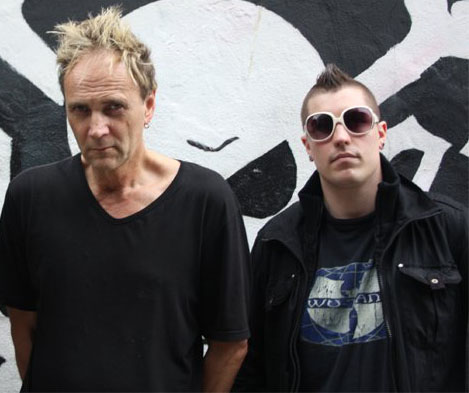

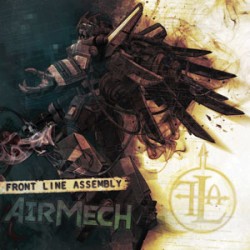
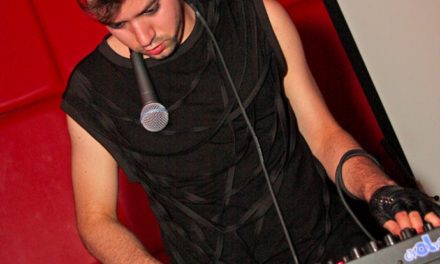
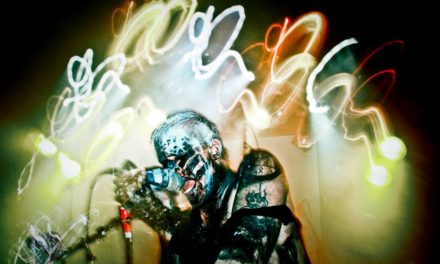
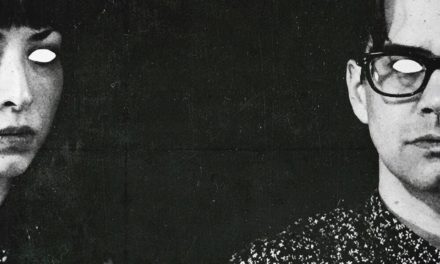
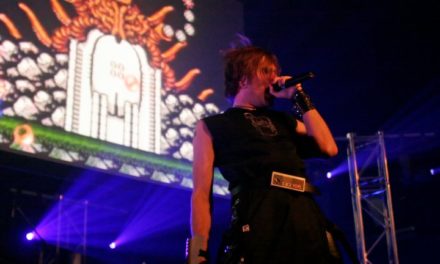
Good interview
Kind of sad your dropping the guitars, the last album was killer, but at the same time I loved Gashed Senses & Crossfire, Caustic Grip, and Tactical Neural Implant, so if those are the roots your returning to, but in a modernized sense I’m down, and I’m sure other FLA fans would be
This creativity coming out these days,is for me paradise.
A great album,tour,fresh influences and now,Delerium,AirMech,back to the roots with Rhys.
Is there anything a FLA Fan wants more?
Ihr seid der Hammer!
Liebe Grüsse Björn
FLA are LEGENDS in the Industrial Scene. Still making great music and putting on awesome shows. I saw FLA in 1989, 1991, 1996, 1998, 2007 and 2011 and they get better every time.
Bill Leeb and friends, now and then: Michael Balch, Rhys Fulber, Chris “Corndog” Peterson, even Greg Reely and now Jeremy Inkel can have his place in this famous musical Dream Team!